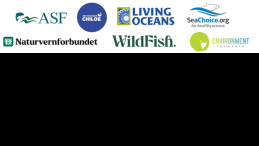New ASC Farm Standard serves salmon industry, not oceans
For immediate release: Across the globe, conservation groups from major salmon farming regions – Norway, Canada, Chile, Scotland, and Australia – have criticized the Aquaculture Stewardship Council’s (ASC) newly released Farm Standard for continuing to endorse irresponsible salmon farming practices that place wild fish and marine ecosystems at risk.
The ASC Farm Standard adopts Salmon Standard criteria that are either outdated or have been weakened over the last decade to accommodate industry ‘business as usual’ practices:
- Allowable chemical treatments remain high: The 2019 increase – up to 350 per cent in some regions – of the total number of chemical treatments permitted to treat sea lice. For example, farms in Chile and Scotland are allowed up to 9 parasiticide treatments.
- Sea lice levels remain a threat to wild salmon: The 2021 increase – up to 1,550 per cent in some regions – the number of sea lice allowed on certified farms. For example, in British Columbia, ASC allows 3 adult sea lice per fish (up from a previous 0.1 adult female per fish).
- Wild fish feed dependency continues to drain oceans: The amount of wild fish within salmon feed allowed remains high: 1.2 kg wild fish (fish meal) and 2.52 kg (fish oil) to produce 1 kg of farmed fish. These ratios have remained unchanged since 2017.
- Allowable antibiotics treatments remain high despite the threat of resistance: Six antibiotics treatments per cycle are allowed, which is unchanged since the first Salmon Standard was published in 2012.
- Free pass for farms located in Protected Areas: Exceptions for salmon farms within high value conservation and marine protected areas continue, remaining unchanged since 2014. For example, certification has been awarded to farms located in Chilean-Patagonia’s Alberto de Agostini National Park.
The Farm Standard also introduces new changes for salmon farms that miss the mark:
- Intermediate farms included, but hatcheries criteria weakened, and broodstock sites omitted: intermediary or early grow out farms that can occur between hatchery and final-grow out phases have long been excluded by ASC are at last included; however previous hatchery environmental requirements have been removed and/or weakened. Broodstock sites (farms used for breeding salmon) have no requirements.
- Water quality requirements likely to miss impacts: ASC has adopted a water-body level assessment but only requires dissolved oxygen compliance limits at 5 meters which will fail to detect impacts in places such as Macquarie Harbour where low oxygen levels in mid to bottom waters are the primary threat to the endangered Maugean skate.
During the consultation phases of the Farm Standard, multiple conservation groups argued the ASC must go beyond mere government regulations, and industry norms, if they are to claim any form of credibility as a certification. Unfortunately, the ASC did not heed the calls of the conservation community.
Consumers and retailers alike should not trust the ASC ‘responsibly sourced’ label on farmed salmon. Nor should they trust competition certifications, the Global Seafood Alliance’s Best Aquaculture Practices (BAP) or GLOBALG.A.P., which have also been criticized by the conservation groups for weak standards and greenwashing.
Globally, around 32% of farmed salmon production is ASC certified with most certified farms being in Norway (52% certified) and Chile (25% certified).
-end-
Quotes:
Kelly Roebuck, SeaChoice representative from Living Oceans (Canada), said “There is mounting evidence that farmed seafood certifications including ASC, BAP and GLOBAL.G.A.P. are not fit for purpose and are contributing to the greenwashing of unsustainable practices. The ASC has consistently relaxed their standards over the years to accommodate industry norms and, as a result, sections of the final ASC Farm Standard actually have a lower environmental bar than that of the first Salmon Standard launched in 2012.”
Neville Crabbe, V.P. Communications and Special Projects, Atlantic Salmon Federation (Canada), said: “Consumers rely on third-party certification programs to make responsible seafood choices. These labels signal that companies are exceeding basic legal requirements, going the extra mile to be better than the competition. Unfortunately, the Aquaculture Stewardship Council is bending toward the industry, not creating a high standard that challenges companies to do better.”
Truls Gulowsen, Head of Naturvernforbundet, Norwegian Society for The Conservation of Nature (Norway), said: “An environmental certification standard that doesn't take into account these challenges to the salmon farming industry isn’t adding much to an already too weak governmental regulation.”
Andrew Graham-Stewart, Scottish Director, WildFish (Scotland, UK), said: “Until such time as this industry can demonstrate conclusively that it can stop the appalling impact on wild salmonids and on the wider marine environment in Scotland, no-one should buy or eat Scottish farmed salmon, nor should anyone be fooled by meaningless slogans like ‘responsibly sourced’. These new standards from the ASC merely illustrate the degree to which the ASC has been captured by the industry it now serves.”
James Overington, Chief Executive Officer, Environment Tasmania (Australia), said: “In 2017, the ASC stopped certifying Macquarie Harbour salmon farms as their standard was endorsing environmental degradation caused by the reckless expansion of the salmon industry. Now, with Macquarie Harbour farms identified as the primary threat to the endangered Maugean skate, and the Farm Standard ill-equipped to address the unique ecosystem, we call on the ASC to stay out of the harbour to prevent being associated with endorsing extinction.”
-30-
Contact Information
Canada (B.C.): Kelly Roebuck, Living Oceans and SeaChoice kroebuck [at] livingoceans.org | Karen Wristen, Living Oceans and SeaChoice 604 788 5634
Canada (Atlantic): Kristen Noel, Atlantic Salmon Federation knoel [at] asf.ca | 902 499 1801
Norway: Truls Gulowsen, Naturvernforbundet, tg [at] naturvernforbundet.no | +47 901 07 904
Scotland: Immy O’Keefee, WildFish immy [at] wildfish.org
Australia: James Overington, Environment Tasmania james [at] et.org.au | 0403 833 776
Chile: defendamoschiloe [at] gmail.com

